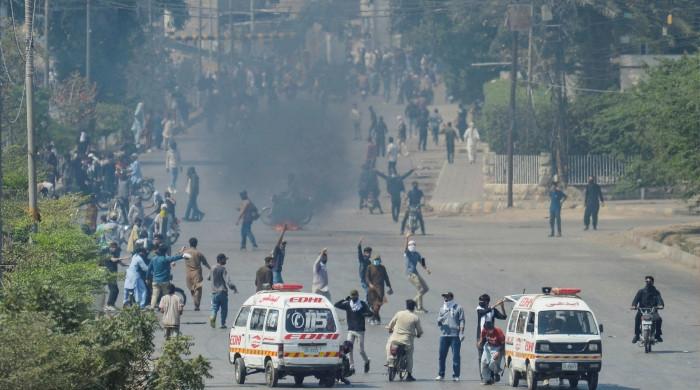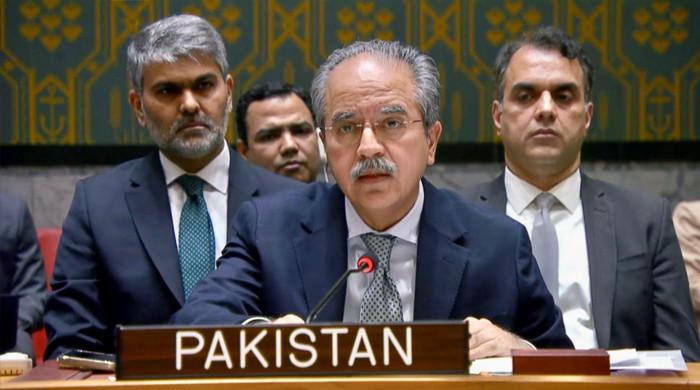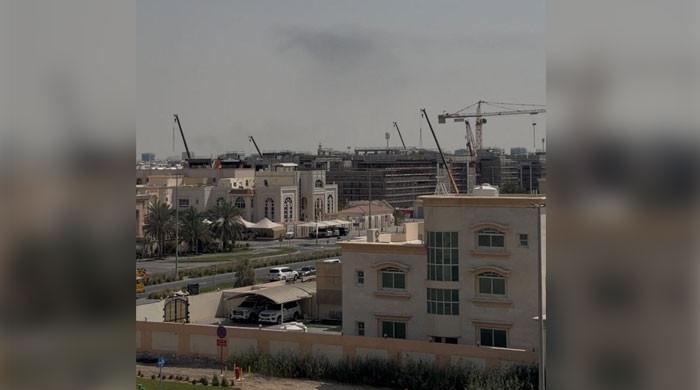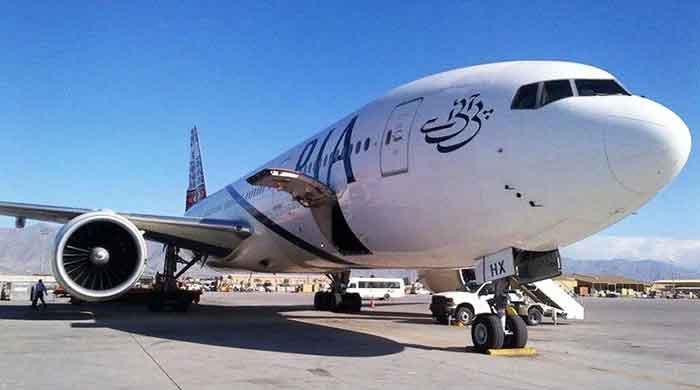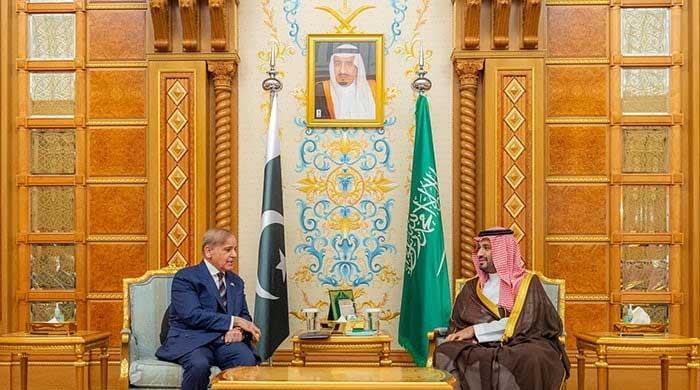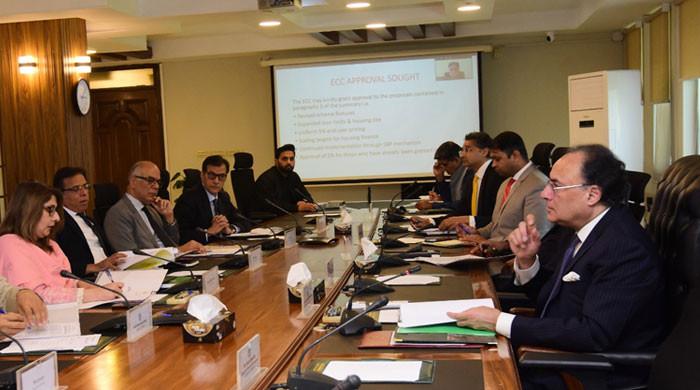Deadlock in govt-opposition talks over NAB, FATF bills
If amendment to Anti-Terrorism Act (ATA) was passed, then Pakistan would turn into a horrible dictatorship, Abbasi says
July 28, 2020
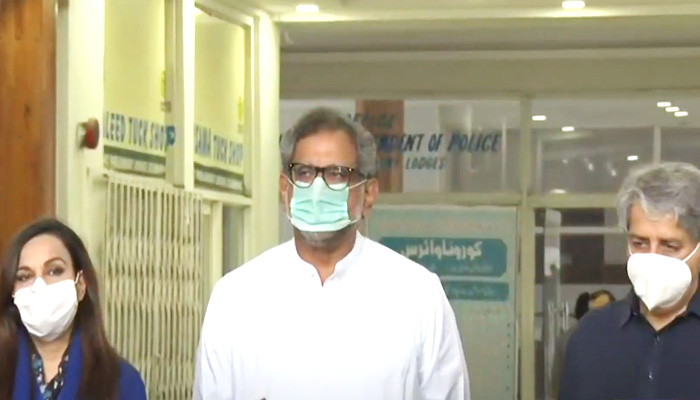
LAHORE: Leaders of the Opposition parties, including the PPP and PML-N, on Tuesday walked out of the talks over various draft legislation, including those on the National Accountability Bureau (NAB) and Financial Action Task Force (FATF), saying the PTI-led government was not speaking in "good faith".
Addressing a press conference alongside PPP leader Sherry Rehman, PML-N's Shahid Khaqan Abbasi confirmed that the Opposition parties have walked out of the talks with the government and told the media that they wished "to put forth to you the entire truth".
Noting that among the draft bills were amendments in the Anti Terrorism Act (ATA), 1997, the United Nations Security Council (UNSC) Act, 1948, and the NAB Ordinance 1999, Abbasi explained that the Opposition parties told the government they were willing to join the debate if the bills were in the public interest and in line with the Supreme Court's directions.
"A committee of the parliament [to debate] on these bills was formed — which I think is a unique instance because such a committee was perhaps formed over the 18th Amendment but never in any other situation — so these bills were taken very seriously.
"All four of these bills were to be simultaneously passed in the National Assembly before going on into the Senate," he added.
The former prime minister went on to explain that the amendment in the ATA was "so frightening that we told [the government] that if passed, then Pakistan would not remain a democracy but would turn into a horrible dictatorship".
After arguments from both sides on the changes sought by the government, however, the bill was withdrawn, he said.
With regard to the UNSC Act, the PML-N leader said it was approved after some amendments the Opposition had suggested were accepted.
The amendment to the NAB Ordinance 1999, however, was the "same ordinance" that the government had passed earlier, Abbasi said. It also included a clause on the "extension of service" of the chairperson and vice chairperson of the anti-graft watchdog but was later withdrawn.
"The remainder of that amendment was the same as the Ordinance presented earlier but had an addition that was totally against the Qanun-e-Shahadat [Law of Evidence], so we told the government that that, too, was unacceptable," he added.
Abbasi mentioned that a smaller committee was then formed to pour over the amendments to the NAB Ordinance 1999 "section by section" before finalising a new draft.
In a meeting yesterday, the Opposition then put forth amendments in each section that they believed were in accordance with justice, the Supreme Court's observations and prior directives, and the Council of Islamic Ideology's (CII) decisions, to which the government responded it would apprise of its stance a day later.
In today's meeting, however, the government informed the Opposition that it did not agree with the latter's proposed amendments.
"We told them we had put forth numerous amendments because there was a section-by-section debate [and asked them] which amendment do you not agree with?
"They did not have a response to that. So we said, 'If you are not speaking of these amendments in good faith — you were the ones who came up with this bill — then we can't go forward,' and excused ourselves from that meeting," the former PM explained.
"Since the talks cannot be held now as the government is not speaking in good faith and its intentions are not to working in favour of the national interest, we walked out of that committee.
"Our decision now is that all [Opposition] parties will consult and it's our recommendation that whatever talks take place should happen from the forum of the APC [All Parties Conference]," he concluded.
'Pakistan's interests come first'
Shortly before the walk-out, Foreign Minister Shah Mehmood Qureshi spoke in the National Assembly, saying the government had extended its hand to the Opposition for cooperation because "Pakistan's interest is paramount".
"Our goal is to break free from the [FATF's] grey list. We have to carry out some legislation to get out of the grey list," Qureshi said. "Governments come and go but Pakistan's interests come first.
"We are here today, we may not be here tomorrow but national interests are important. It is important to legislate on the FATF," he underscored.
Qureshi said the government stressed to the Opposition that there was a deadline for making the FATF legislation but they "demanded the NAB bill be discussed at the same time and that it would be a package deal".
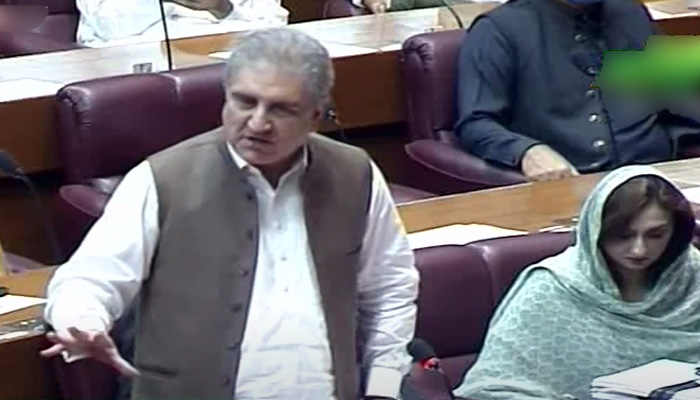
"The Opposition parties demanded amendments to the NAB law at the same time, saying they would not proceed without it," he explained, adding that each point of the joint proposals from the PPP and PML-N were pondered upon.
Terming the four bills "a necessity", he said the PTI decided after deliberations it could not accept the 35 amendments to the NAB Ordinance that were presented by the Opposition and put forth to Prime Minister Imran Khan.
Read more: Qureshi says Opposition asked for time to consult on draft legislation, including NAB, FATF
The federal minister said the amendments, if accepted, would have done away with the issue of money-laundering and made the anti-corruption body "meaningless". The revisions had to be done keeping in mind the interest of the people, he underscored.
"They suggested that the NAB investigate any corruption upwards of Rs1 billion," he told the NA, adding that maybe the Opposition needed to revisit their suggestions for the amendments may not be in the public interest.
Speaking about the east-side neighbour, the foreign minister said India's conspiratorial elements wished to economically harm Pakistan. However, "effective diplomats and friendly countries are helping us thwart the Indian ambitions", he added.
Qureshi further said the Opposition suggested that a person convicted by the NAB should not be disqualified from being a member of the Assembl, that five-year-old cases — no matter how horrible — would not fall under the NAB's jurisdiction, that no arrests be made until the trial is over, that cases of corruption be sent to the NAB if above Rs1 billion, and that public office holder be sentenced to five years instead of 10 if found guilty.
"The Opposition wants to reduce the powers of the NAB chairperson [who] was appointed by the PML-N and PPP. Their amendments to the NAB laws could lead to [Pakistan] getting stuck in the FATF" again, he added.
Noting that efforts against money-laundering and terror-financing were important components of the FATF's requisites, he asked: "What will happen if someone commits corruption of Rs990 million?
"We cannot support the Opposition's proposals on amendments to the NAB Ordinance. They should reconsider their suggestions," he advised, adding that they should look at the FATF and corruption from respective lenses.
The minister underlined that legislation on the FATF issue should go beyond political affiliation and that the Opposition should reconsider its proposals for the sake of Pakistan, not the government.
"In my view, national interest should take precedence over everything else. Doors do not close in politics, so, come, let's solve the country's problems together!"





